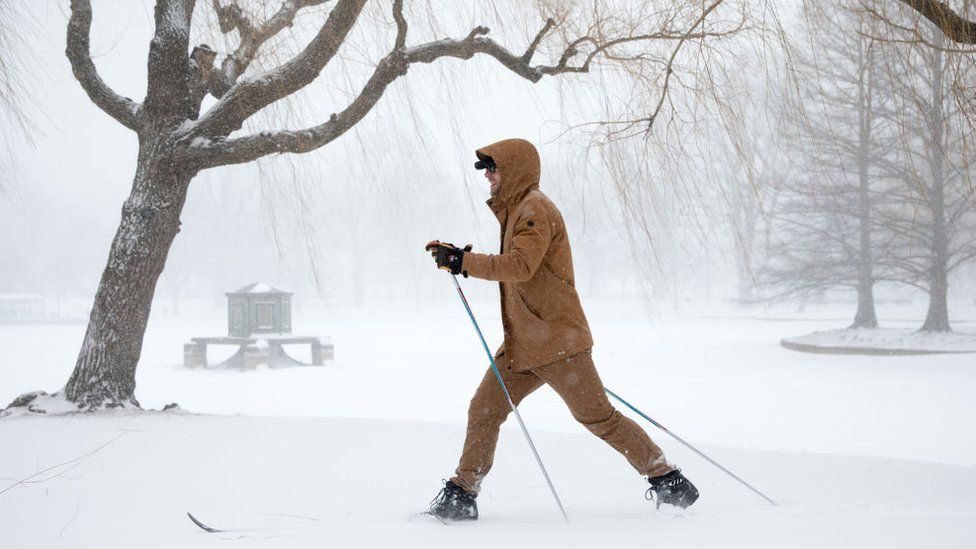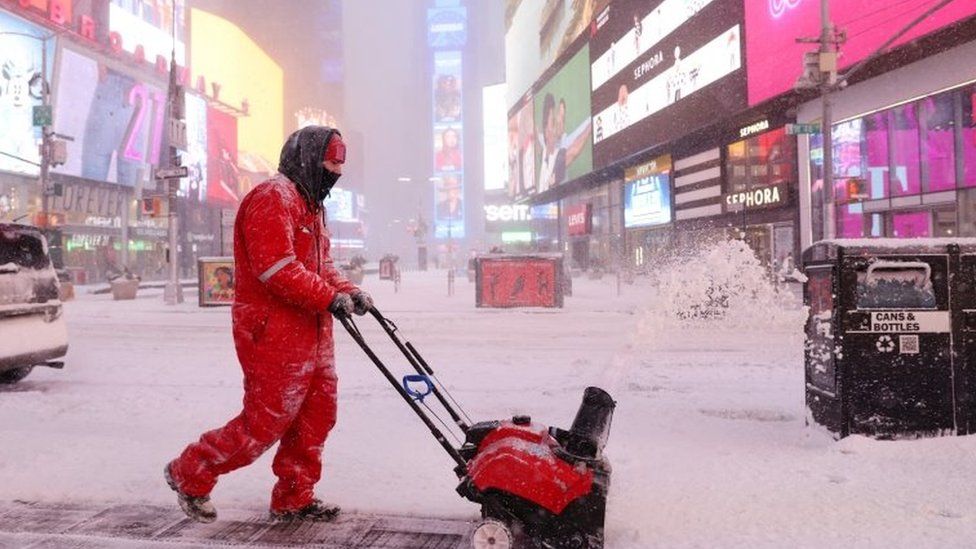
This article is more than
4 year oldSome areas are being "clobbered" by heavy snow and hurricane-force winds, and five states declared emergencies ahead of the storm's arrival.
Experts warn of "historic" snowfall in some places and flood warnings have been issued near the coast.
More than 80,000 households across Massachusetts were suffering power outages by Saturday morning.
Forecasters say there is a chance the storm, known as a Nor'easter, will blanket the Boston area with up to 2ft (61cm) of snow, and up to 1ft (30cm) of snow has already fallen in parts of New York.
The current record of 27.6in (70cm) within 24 hours was set in 2003.
Gusts as strong as 60-75mph (96-120km/h) have been forecast along the coastline and over 5,000 US flights have also been cancelled across the weekend because of weather disruption.
Experts say the storm will undergo bombogenesis, meaning that colder air is expected to mix with warmer sea air, leading to a swift drop in atmospheric pressure. The process leads to a so-called bomb cyclone.
"Travel should be restricted to emergencies only," warned the National Weather Service (NWS) in Boston.
"If you must travel, have a winter survival kit with you. If you get stranded, stay with your vehicle."
The powerful storm began to hit the country's coast in the early hours of Saturday morning, with inches of snowfall already blanketing a number of states.
Bryce Williams, a meteorologist based in the state, told the New York Times the heaviest would hit there by Saturday evening before conditions clear up across the weekend.
"If you don't have to be out and about, we're trying to say: Stay home until Sunday," he told the newspaper.


Winds are expected to strengthen, possibly reaching hurricane-level speeds, according to the NWS and Accuweather. A blizzard warning has been issued throughout the north-east, the first time such an alert has been issued since 2018.
The governors of New York, New Jersey, Maryland, Rhode Island and Virginia declared states of emergency, telling residents to stay off the roads for their own safety.
75 million people are in the path of the storm, according to CBS News.
New York Mayor Eric Adams cancelled outdoor dining for Saturday, as well as vaccine appointments, but struck an optimistic tone when telling reporters that the city was handling the storm like "a well-oiled machine".
New York Governor Kathy Hochul has said that the storm "could be life-threatening" and suggested that residents stay home "with a six pack of beer and wait it out".
Police in New Jersey's Atlantic City pleaded with residents not to "make it harder on our first responders by venturing out", while Governor Phil Murphy said that the state's famous shoreline "is getting getting clobbered" by the storm.
In Connecticut bus operations have been suspended until Sunday, while Rhode Island Governor Dan McKee has announced the closure of several bridges due to "dangerous conditions".
Florida is also expected to see some of its coldest temperatures in years, leading to iguanas - a cold-blooded lizard species - to become immobilised and fall out of trees.